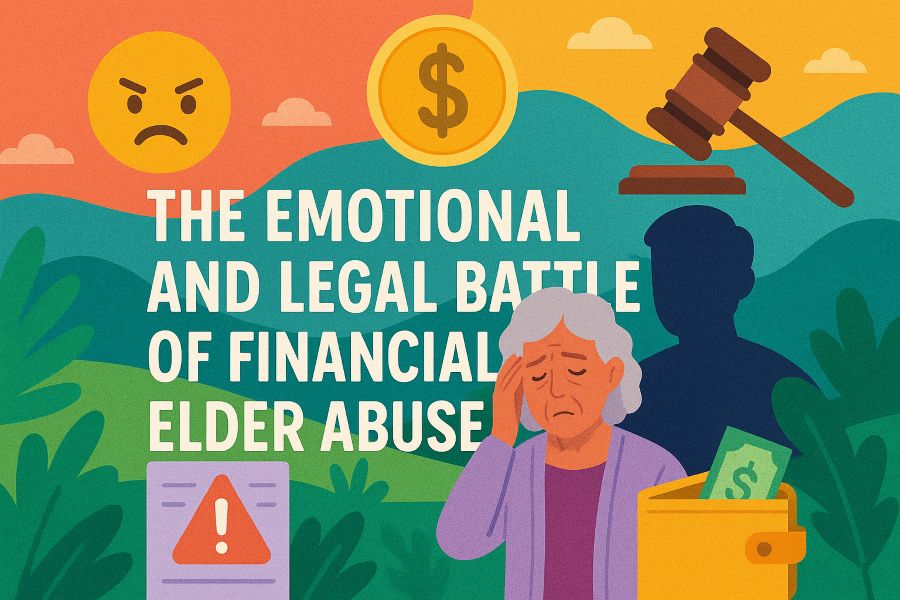The Emotional and Legal Battle of Financial Elder Abuse — and How Attorneys Turn the Tide

Every day, older adults across America lose their hard-earned savings not to strangers, but to people they once trusted. Financial elder abuse happens quietly—through forged signatures, manipulated wills, or deceitful caregivers. It’s a betrayal that cuts deep, both emotionally and financially.
For many families, realizing that their loved one has been exploited brings a wave of shock and guilt. But this is where a financial elder abuse attorney steps in—not only to recover what’s been stolen but also to help families find justice and peace.
When Promises Turn Poisonous
Recognizing the Silent Signs of Exploitation
Financial abuse often hides behind everyday actions. You might notice unexplained bank withdrawals, missing valuables, or sudden changes in estate plans. According to National Adult Protective Services, millions of seniors experience financial exploitation each year, but most cases go unreported.
The emotional toll can be devastating. Victims often feel ashamed, confused, and afraid to speak up—especially when the abuser is someone close, like a caregiver or even a family member. That’s why early detection matters more than ever.
When Loved Ones Become Suspects
It’s one of the hardest realities: sometimes, the person responsible is not a stranger. Family members might manipulate an elder’s trust for personal gain, convincing them to sign over property, change beneficiaries, or give “loans” that are never repaid.
This betrayal creates not just financial loss, but deep emotional scars. Families fracture, trust fades, and seniors often retreat into isolation. These are the moments when having a financial elder abuse lawyer becomes a lifeline.
The Legal Maze Families Face
Why Reporting Isn’t Always Enough
While many states require mandatory reporting of elder abuse, simply reporting the issue doesn’t guarantee protection or recovery. Investigations can move slowly, and proving intent in financial crimes is complex.
This is where a financial elder abuse attorney makes a difference. They gather bank records, contracts, witness statements, and medical evidence to show the senior’s mental state and the suspect’s influence. Their work bridges the emotional gap between what families feel and what the law requires to take action.
How Attorneys Build a Strong Case
A skilled financial elder abuse lawyer knows that every case starts with a story—one that needs to be translated into legal evidence. They:
- Review financial documents for suspicious activity.
- Trace asset transfers or forged transactions.
- Identify patterns of coercion or manipulation.
- File civil claims or criminal complaints, depending on the situation.
Attorneys don’t just argue in court—they protect dignity. They ensure victims are treated with respect and that their life savings don’t disappear due to deceit.
Rebuilding What Was Lost
Recovering Assets and Restoring Confidence
Once a case is proven, attorneys work to recover stolen funds or property through civil litigation or settlements. Sometimes, they can reverse unauthorized transactions or recover money through restitution orders.
But beyond recovery, their real goal is restoration—helping families rebuild financial confidence. For many victims, simply knowing someone fought for their rights brings immense relief.
Preventive Legal Tools Every Family Should Know
To prevent future exploitation, financial elder abuse attorneys often recommend proactive legal safeguards, such as:
- Establishing durable powers of attorney with clear limitations.
- Setting up revocable living trusts managed by multiple trustees.
- Using third-party financial monitoring for unusual activity.
- Drafting estate plans that protect assets from undue influence.
These preventive steps not only protect assets but also empower seniors to stay in control of their finances.
Turning Pain Into Protection
A Story That Changed Everything
Take the case of Linda Thompson, an 82-year-old widow who trusted her nephew to manage her finances. Within months, her savings were nearly gone, and her home was quietly transferred into his name. Distraught, her daughter sought help from a financial elder abuse attorney.
The lawyer uncovered forged signatures and hidden bank accounts. Within a year, Linda regained her property, and her nephew faced legal consequences. But more importantly, the family learned how to set boundaries, create financial checks, and rebuild trust.
This story mirrors thousands of others across the country—proof that justice, though delayed, can still be delivered.
From Awareness to Action
Awareness is the first line of defense. Families who talk openly about money, review financial statements regularly, and stay alert to sudden behavioral changes in their elders can prevent abuse before it starts.
Attorneys often conduct educational workshops or partner with senior advocacy groups to spread this message. When legal professionals and families work together, they create a strong network of protection around those most at risk.
Conclusion: Justice Is More Than a Verdict
The emotional and legal battle of financial elder abuse is a long road—filled with pain, patience, and persistence. But with the help of a financial elder abuse attorney, that road leads to justice, recovery, and renewed strength.
Behind every case is a reminder: protecting our elders isn’t just a legal duty—it’s a moral one. When families, communities, and attorneys unite, they do more than reclaim money—they reclaim trust, dignity, and hope for those who once gave us everything.



